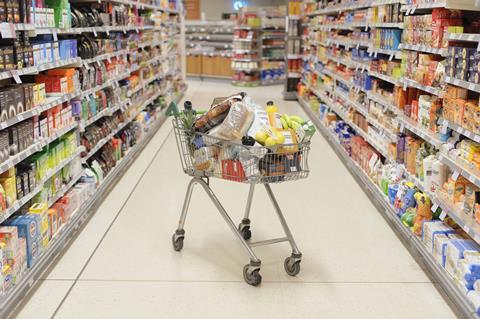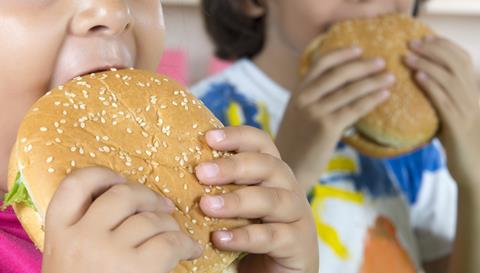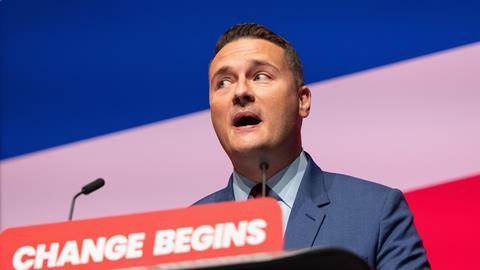A House of Lords committee has urged the government to revisit Henry Dimbleby’s ideas on taxation and advertising restrictions
A House of Lords report last week called for a sweeping crackdown to fix the “broken” food system.
The results of the nine-month Food, Diet & Obesity Committee inquiry, led by committee chair Baroness Joan Walmsley, offered damning criticism of the food industry’s role in creating a national obesogenic crisis for the NHS.
The report has been seized upon by campaign groups as the basis for a new era of nanny state intervention – which they say is not something to be feared but embraced following 30 years of failure of voluntary efforts to tackle obesity.
But do its proposals have any chance of being taken up by the government?
The call for a wave of HFSS taxes on the industry carries the biggest financial implications, reviving proposals in Henry Dimbleby’s 2021 National Food Strategy.
His model, ignored by the last government and which even its author admitted was financially unpalatable, suggests a £3/kg tax on sugar and a £6/kg tax on salt in all processed foods, which he claims would encourage manufacturers to reformulate their products to use less sugar and salt. Where products cannot be reformulated, the increased cost would be passed on to consumers, making them less appealing – at least so the theory goes.
Factory gate taxes
The system would involve either taxing sales to manufacturers and foodservice businesses, or taxing all sales of sugar and salt when they leave the factory gate, and then allowing supermarkets to claim a rebate for sales to consumers.
To stop food manufacturers “relocating overseas” to avoid it, Dimbleby suggests imports of processed food should also be taxed according to sugar and salt content.
Not only does the Lords report back Dimbleby’s plan, they want a rollout “as soon as possible” and within two years at most.
Dimbleby said the government should give the industry three years.
The committee also appears to misinterpret, deliberately or otherwise, Dimbleby’s call for the new tax system to replace the soft drinks industry levy (SDIL), introduced in 2018.
It urges the government to “build on the success” of SDIL by reducing current thresholds, while bringing milk-based drinks into scope.
It may already have its wish, with Chancellor Rachel Reeves this week announcing SDIL rates would increase each year over the next five years to reflect Consumer Price Index inflation, while applying per 10 litres instead of per litre. Thus, from next April the lower rate will rise from 18p per litre to £1.94 per 10 litres, while the higher rate will go from 24p per litre to £2.59 per 10 litres.

Meanwhile a review is underway into the sugar content thresholds at which the SDIL applies, and whether to remove exemptions for milk-based and milk substitute drinks.
Speaking in a Food Foundation webinar the day after the House of Lords report landed, committee chair Baroness Joan Walmsley said taxing the industry would save the NHS “billions of pounds” .
“The committee was shocked by the general ill health and human misery that a poor food system is causing,” she said. “What we know with the sugar tax is that the manufacturers reduced sugar to pay less tax.
“The industry will try to avoid paying the tax by reformulating.”
Some think Labour will seriously consider expanding the sugar tax, despite the economic backdrop and its pledge not to hit working families.
In May sources told The Grocer it had looked very closely at the National Food Strategies proposals and it has widespread support as an “off the shelf solution”.
But the Lords’ proposed barrage of taxation, especially in such a short timeframe, goes even further.
Growth calamity
Shore Capital analyst Clive Black claims the proposed raft of new HFSS taxes would be a “calamity” for economic growth.
“Taxes of the nature discussed across ‘undesirable foodstuffs’ could be notably inflationary just when the government needs base rates to fall,” he says. “The MPC (monetary policy committee) could take a dim view of food-inspired inflation, so potentially impeding base rate reductions.”
Indeed, health secretary Wes Streeting, speaking in September after a report by ex-health minister Lord Ara Darzi called for “bold action” to regulate the food industry, appeared to rule out taxes. “That wasn’t in our manifesto,” he said. “We’re reluctant to go down that sort of route is because there is a cost of living crisis. Crucially, on public health and prevention measures, we’ve got to take people with us.”
Yet Anna Taylor, executive director of the Food Foundation, says the political context has changed. “The HOL report represents a growing recognition that companies who are creating significant external costs should be made to contribute to these costs – the polluter pays principle.
“The tax would be on manufacturers to help incentivise change and it must be understood that it would not fall on consumers.”

Of 700 chiefly voluntary initiatives in the past three decades to tackle obesity, none, says the report, have worked, with the exception of 2018’s sugar tax, which is singled out as a ‘beacon of hope’.
Again following Dimbleby’s lead, the report also calls for the government to bring in mandatory targets on sales of “healthier products” for large food businesses by September 2025.
It also wants mandatory target dates for reduction of salt, sugar and calories for large businesses, with progress to be monitored by the FSA, stepping into a major new role as the independent regulator responsible for the obesity crisis.
And while other measures proposed – including a total ban on HFSS ads – seem too extreme to see the light of day, the Lords could well be kicking at an open door when it comes to mandatory reporting.
Read more:
-
Supermarket bosses oppose plans for FSA to take on war on obesity
-
Little helps or Big Brother: AI’s role in health & obesity
-
Wes Streeting pledges to ‘work with industry to tackle obesity crisis’
-
Lords’ recommendations are draconian, but unlikely to see the light of day
The Food Data Transparency Partnership (FDTP) – involving most leading food companies and retailers, and set up under the last government in response to the National Food Strategy – has already pretty much agreed the framework for a voluntary system of reporting based on the proportion of HFSS products sold by major companies.
Labour has not yet signalled whether FDTP will continue, but many believe Streeting will use it as the basis for a mandatory reporting requirement.
Yet another controversial call in the report is for food companies selling a large number of HFSS products to be excluded from policy talks – something Streeting this week rejected, vowing to “work with industry”.
Meanwhile, various models of mandatory targets are emerging. In February, influential nudge group Nesta called for supermarkets to face fines of up to 1% of their annual turnover from the FSA if they fail to comply with a system of mandatory healthy food targets, which it recommended focuses on the UK’s biggest 11 food retailers.
The BRC also backs mandatory health targets, though it says they will only work if the targets cover all sectors.

UPF concerns
But in one area at least, the Lords did not go as far as some in the food industry feared, despite it being the biggest dietary talking point of recent months: utra-processed foods.
As FSA chair Susan Jebb told the inquiry, fears over UPF have captured the public imagination in a way HFSS never has, and its role was flagged up as one of the key purposes of the report when it launched in February.
While the report identifies food types that do and don’t count as UPF, it admits there is as yet no “clear evidence” for the sweeping actions called for by some, such as front-of-pack warning labels or a total ad ban, as called for by the likes of Dimbleby and anti-UPF figurehead Chris Van Tulleken.
“There is growing epidemiological evidence of a link between UPF and bad health outcomes but we need more and it needs to be as much as possible independent of the food industry, with SACN and the FSA taking account of that research and guiding government policy,” says Walmsley.
Alex Johnstone, professor of nutrition, obesity and disease at the Rowett Institute, University of Aberdeen, says: “I think the conclusions they reached reflect what SACN has said, that we need more research, and that’s good because it brings back into focus the importance of healthy eating and nutrients involved in supporting healthy weight.”
Yet the momentum against UPF continues to grow. It seems only a matter of time before campaigners and politicians return to call for further restrictions. Whether that’s viable, politically, economically or regulatorily is another matter.

























1 Readers' comment